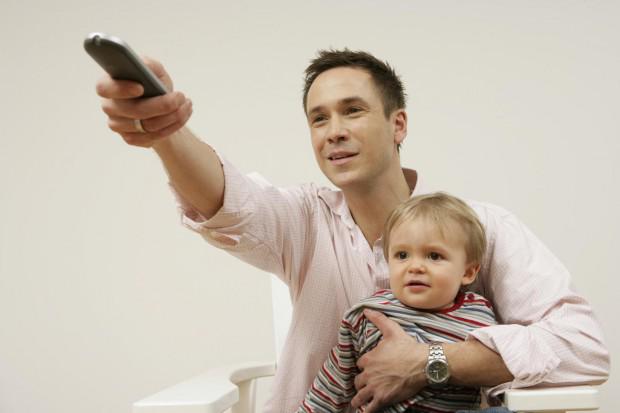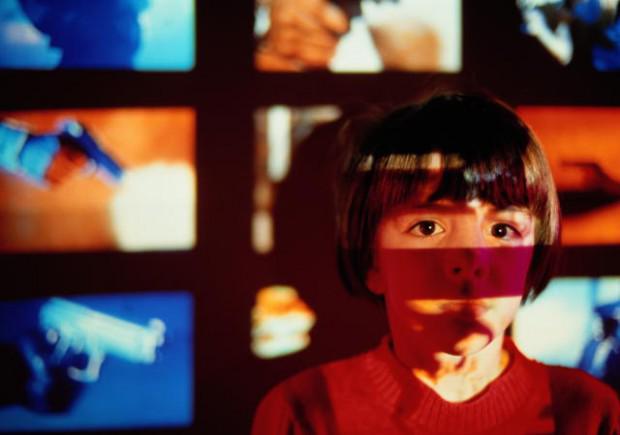943
6 ways that TV is changing your life
Watching of series leads to unexpected posledstviyam
The average person watches TV 4 hours a day. Average. And it changes it - just like any other person changes the four-hour daily operation. However, a surprisingly difficult to get people to accept this simple fact.
1. Television is changing you, even if you are too young to understand what you smotrite
It is easy to assume that TV shows can affect impressionable children, but what about the little ones? After all, they do not even realize what is happening around.
The researchers observed the thousands of children under the age of two and a half years. "Television habits" of these children and the effects of excessive TV viewing was simply amazing, even after the researchers excluded all the other factors that influence the behavior of children.
The more people watching TV as a baby, the more likely that he grew up, he will suffer from obesity, it will be bad at math in school, and to behave in this school, he is not very good.
Once again: it is not the result of watching soap operas with scenes of violence or something like that that will continue to encourage children to do bad things. Unlikely to 3-year-old child is able to learn those "lessons».
No, the thing is the act of watching TV.
And again, it's not because of a certain type of parents who love their child to leave the front of the TV all day. The results are repeated, even if all other factors in the education of children are quite different.
And the results are similar to studies in the world. Researchers in New Zealand found that the more hours the kid spends watching television, the more likely it is that he grew up he stops going to school. And in France, even forbidden to broadcast, in the "target audience" which may include children younger than three years.
2. Television reduces your ability sosredotachivatsya
Since the TV - especially children - incredibly fast and literally bustles with different stimuli, it is easy to assume that the human brain may well over time to adapt to the pace of filing such information.
When the teacher in the school can not add to his lesson a little explosions or dinosaurs, the changed TV the ability to focus the child does not allow him to stay focused.
Those of us who can not be bought on the slogans of the form "the modern world consumes children" is very difficult to believe that too much television, and the volume can indeed rebuild the ability to concentrate.
A study conducted by experts from the University of Iowa, helped establish that students who are looking at the screen for more than two hours a day are twice as likely to have problems with concentration, which is surprising when you consider that a small child in front of TV spends on average 4, 26 hours a day.
In the other study involved 1,323 man. They were children aged three to five years, as well as 210 students. The results suggest that although the TV or change the full function of the human brain, but the impact on them very much.
3. Television alters your sny
Science says that television is capable of changing your dreams. Studies show that some people have dreams of monochrome (ie black and white) and the blame for this can only TVs.
A study was conducted which involved 50 volunteers. Half of these people was under 25, the second half - by 50 subjects completed a questionnaire, the questions which have been linked to the color of their dreams, their contentment with family life and with their formation in childhood.
Thereafter, subjects were asked to keep a detailed diary of his dreams. The researchers found that almost none of the young people described their dreams as the black white (the figure was only four per cent). But people from the group of 50-year-old wrote only of black and white dreams. The whole group consisted of people who actually grew up in the black-and-white television.
Researchers attribute this phenomenon to the clock that the subjects spent in front of television during his psychological formation, but so far there is no way to reliably determine whether or not the dreams of older people were black-and-white or subjects just remember them as due to many years of sitting in front of TV .
Anyway, all this is rather strange.
4. Television eliminates odinochestva
You may know people who are so immersed in all kinds of series and TV shows that simply refuse any social interaction until the last episode will look.
Some of you may be waiting for the day when the people realize that fun and emotional support needs real friends, only this day might never come. Because the experts found that television, particularly pseudo-relationship with the characters on the TV screen, can dull the sense of loneliness and rejection.
Using a combination of the four studies, experts have shown that television shows can cause people with low self-esteem, rejected by family and friends, a sense of belonging to what is happening on the screen. This is called "social surrogacy hypothesis." And it suggests that in order to fill the void that has arisen due to social deprivation, the person is ready to establish relations even fictional characters.
One study showed that participants who consistently feel a sense of loneliness, began to feel much better after switching on your favorite TV shows.
In another study, subjects had to write an essay about their favorite television show or an essay on some other, random theme (it was engaged in the control group). Subjects who have written about your favorite shows, using fewer words, expressing the loneliness than in the control group.
While researchers are not able to accurately understand what exactly makes a strong emotional bond established with television characters: the overwhelming need for social interaction, or actually fulfills this need.
5. Television - reason ozhireniya
Obesity - a kind of hallmark of those who have too much watching TV. So do not be surprised that one was found a correlation between watching fewer gears and burning more calories.
However, researchers have found that people who watch TV less, burn more calories every day, not because they have great physical activity and physical activity above. It is enough that these people use their brains for their intended purpose, and he remains for hours in a daze in front of TV screens.
At the University of Vermont's experts conducted a six-week study, which involved 36 volunteers. Their weight ranged from moderate to extreme fullness stages of obesity. The subjects watched television an average of five hours a day.
20 test experts cut while viewing by connecting their TV special tracking devices, which turn off the TV when the maximum number of views per week was reached.
It has been found that subjects with limited time viewing burned on average 120 calories per day than the control group, in which time display is not restricted.
Factors contributing to additional calorie burning were common daily activities and tasks, such as reading books, board games or doing normal work on the farm.
The amount of food eaten, by the way, was not limited with the limitation of TV viewing. Burning calories is because the subjects switched to a more complex in terms of mental activity and for which required more energy.
6. Television makes you zhestokim
The average 18-year-old man during his lifetime sees 200,000 acts of violence including 40,000 murders. The most cold-blooded of our readers probably already have noted that the ratio of violent acts in the killings of 12 to 55. It can be assumed that many of these killings were quite awful. Typically, this happens when the main character on the screen mindlessly mowing down an entire army of what some bumbling thugs in masks.
But no matter how disgusting is the violence that we see on the screen, it affects our behavior. The study, in which 700 children participated in over 17 years showed (again - after exclusion of other negative factors such as poverty, poor education, and so on. D.) That more hours in front of a give more violence.
22, 5% of children who watched TV every day for three hours, make in the coming years much more aggressive actions, such as threats and fights. If the children watched television for more than four hours per day, this figure rose to 28, 8%.
The children who watched TV less than an hour a day, this figure dropped to 5, 7%.
This example, like all previous ones, no doubt cause many of you to exclaim: "But I have a lot of watching television when I was a kid, and nothing terrible has happened to me!" This is undoubtedly true, and it is, incidentally, does not contradict any of the above list of research. None of them said that television is bad for 100% of children watching it. They say only that you are likely to encounter problems if you take too much watching TV. Or too much sitting on the Internet.
via factroom.ru

The average person watches TV 4 hours a day. Average. And it changes it - just like any other person changes the four-hour daily operation. However, a surprisingly difficult to get people to accept this simple fact.
1. Television is changing you, even if you are too young to understand what you smotrite

It is easy to assume that TV shows can affect impressionable children, but what about the little ones? After all, they do not even realize what is happening around.
The researchers observed the thousands of children under the age of two and a half years. "Television habits" of these children and the effects of excessive TV viewing was simply amazing, even after the researchers excluded all the other factors that influence the behavior of children.
The more people watching TV as a baby, the more likely that he grew up, he will suffer from obesity, it will be bad at math in school, and to behave in this school, he is not very good.
Once again: it is not the result of watching soap operas with scenes of violence or something like that that will continue to encourage children to do bad things. Unlikely to 3-year-old child is able to learn those "lessons».
No, the thing is the act of watching TV.
And again, it's not because of a certain type of parents who love their child to leave the front of the TV all day. The results are repeated, even if all other factors in the education of children are quite different.
And the results are similar to studies in the world. Researchers in New Zealand found that the more hours the kid spends watching television, the more likely it is that he grew up he stops going to school. And in France, even forbidden to broadcast, in the "target audience" which may include children younger than three years.
2. Television reduces your ability sosredotachivatsya

Since the TV - especially children - incredibly fast and literally bustles with different stimuli, it is easy to assume that the human brain may well over time to adapt to the pace of filing such information.
When the teacher in the school can not add to his lesson a little explosions or dinosaurs, the changed TV the ability to focus the child does not allow him to stay focused.
Those of us who can not be bought on the slogans of the form "the modern world consumes children" is very difficult to believe that too much television, and the volume can indeed rebuild the ability to concentrate.
A study conducted by experts from the University of Iowa, helped establish that students who are looking at the screen for more than two hours a day are twice as likely to have problems with concentration, which is surprising when you consider that a small child in front of TV spends on average 4, 26 hours a day.
In the other study involved 1,323 man. They were children aged three to five years, as well as 210 students. The results suggest that although the TV or change the full function of the human brain, but the impact on them very much.
3. Television alters your sny

Science says that television is capable of changing your dreams. Studies show that some people have dreams of monochrome (ie black and white) and the blame for this can only TVs.
A study was conducted which involved 50 volunteers. Half of these people was under 25, the second half - by 50 subjects completed a questionnaire, the questions which have been linked to the color of their dreams, their contentment with family life and with their formation in childhood.
Thereafter, subjects were asked to keep a detailed diary of his dreams. The researchers found that almost none of the young people described their dreams as the black white (the figure was only four per cent). But people from the group of 50-year-old wrote only of black and white dreams. The whole group consisted of people who actually grew up in the black-and-white television.
Researchers attribute this phenomenon to the clock that the subjects spent in front of television during his psychological formation, but so far there is no way to reliably determine whether or not the dreams of older people were black-and-white or subjects just remember them as due to many years of sitting in front of TV .
Anyway, all this is rather strange.
4. Television eliminates odinochestva

You may know people who are so immersed in all kinds of series and TV shows that simply refuse any social interaction until the last episode will look.
Some of you may be waiting for the day when the people realize that fun and emotional support needs real friends, only this day might never come. Because the experts found that television, particularly pseudo-relationship with the characters on the TV screen, can dull the sense of loneliness and rejection.
Using a combination of the four studies, experts have shown that television shows can cause people with low self-esteem, rejected by family and friends, a sense of belonging to what is happening on the screen. This is called "social surrogacy hypothesis." And it suggests that in order to fill the void that has arisen due to social deprivation, the person is ready to establish relations even fictional characters.
One study showed that participants who consistently feel a sense of loneliness, began to feel much better after switching on your favorite TV shows.
In another study, subjects had to write an essay about their favorite television show or an essay on some other, random theme (it was engaged in the control group). Subjects who have written about your favorite shows, using fewer words, expressing the loneliness than in the control group.
While researchers are not able to accurately understand what exactly makes a strong emotional bond established with television characters: the overwhelming need for social interaction, or actually fulfills this need.
5. Television - reason ozhireniya

Obesity - a kind of hallmark of those who have too much watching TV. So do not be surprised that one was found a correlation between watching fewer gears and burning more calories.
However, researchers have found that people who watch TV less, burn more calories every day, not because they have great physical activity and physical activity above. It is enough that these people use their brains for their intended purpose, and he remains for hours in a daze in front of TV screens.
At the University of Vermont's experts conducted a six-week study, which involved 36 volunteers. Their weight ranged from moderate to extreme fullness stages of obesity. The subjects watched television an average of five hours a day.
20 test experts cut while viewing by connecting their TV special tracking devices, which turn off the TV when the maximum number of views per week was reached.
It has been found that subjects with limited time viewing burned on average 120 calories per day than the control group, in which time display is not restricted.
Factors contributing to additional calorie burning were common daily activities and tasks, such as reading books, board games or doing normal work on the farm.
The amount of food eaten, by the way, was not limited with the limitation of TV viewing. Burning calories is because the subjects switched to a more complex in terms of mental activity and for which required more energy.
6. Television makes you zhestokim

The average 18-year-old man during his lifetime sees 200,000 acts of violence including 40,000 murders. The most cold-blooded of our readers probably already have noted that the ratio of violent acts in the killings of 12 to 55. It can be assumed that many of these killings were quite awful. Typically, this happens when the main character on the screen mindlessly mowing down an entire army of what some bumbling thugs in masks.
But no matter how disgusting is the violence that we see on the screen, it affects our behavior. The study, in which 700 children participated in over 17 years showed (again - after exclusion of other negative factors such as poverty, poor education, and so on. D.) That more hours in front of a give more violence.
22, 5% of children who watched TV every day for three hours, make in the coming years much more aggressive actions, such as threats and fights. If the children watched television for more than four hours per day, this figure rose to 28, 8%.
The children who watched TV less than an hour a day, this figure dropped to 5, 7%.
This example, like all previous ones, no doubt cause many of you to exclaim: "But I have a lot of watching television when I was a kid, and nothing terrible has happened to me!" This is undoubtedly true, and it is, incidentally, does not contradict any of the above list of research. None of them said that television is bad for 100% of children watching it. They say only that you are likely to encounter problems if you take too much watching TV. Or too much sitting on the Internet.
via factroom.ru























